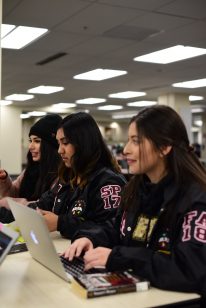Greek life’s foundation is grounded on four pillars — scholarship, friendship, leadership and service — and for many, a house on campus, according to the Division of Student Affairs. For seven multi-cultural chapters at the University of Idaho, members have made a home outside of the four walls of an on-campus house.
Living off campus means these Greek organizations must find creative ways to host chapter events, social gatherings and other functions. Often this means chapter presidents have to book university facilities weeks in advance to accommodate the lack of an on-campus space to call their own.
“The biggest challenge of not being housed on campus is not having a designated area for events or weekly functions,” said Jennifer Rangel, Kappa Delta Chi President. “Sometimes it can be troublesome when there are other events happening at the university.”

Michael Bivens | Courtesy
Omega Delta Phi, a multi-cultural fraternity, is dedicated to the concerns of the community, and the foundation of providing any member a diverse fraternal experience which coincides with higher education, according to Omega Delta Phi’s mission statement.
A difference between multi-cultural Greek organizations and Panhellenic and Interfraternity organizations lies in the rush process. Multi-cultural Greek organizations have no formal recruitment process, according to Omega Delta Phi President Carlos Paez.
“Rushing for ODPhi starts once the semester starts, and that’s with any multicultural organization,” Paez said. “This leads to the biggest misconception when it comes to multicultural organizations, we don’t just accept individuals from all walks of life, ‘one culture, any race.’”
Paez said the recruitment process occurs year-round, and the group seeks out people they believe will be beneficial to the culture and add to the unique experience that multi-cultural Greek life offers.
Paez said while being housed on campus could have perks, he feels it would deteriorate the unique culture of Omega Delta Phi. The costs of insurance would go up as well, which would in turn impact membership costs, he worries.“If we were to do that, I feel that we would become the same as every housed Greek on campus,” Paez said. “At the end of the day one of the reasons I joined was because ODPhi didn’t have a house, so I wasn’t forced to live on campus with many individuals I didn’t feel comfortable calling my brothers.”
Last semester, Former ASUI Senator Ismael Mendoza authored a proposal for an on-campus space dedicated to multicultural Greek organizations. Under the bill, the space would have priority for multi-cultural Greek events and meetings.
At the end of his term last semester, Mendoza passed the information and the proposal to Multicultural Greek Council President Alex Dominguez. Dominguez said he has initiated conversation with UI faculty members about next steps for the proposal, including putting seasonal flags around the Idaho Commons courtyard that represent Multicultural Greek Council organizations.

Alex Brizee | Argonaut
“I think there is great potential to increase recruitment (with this space), it allows for flexibility regarding philanthropic events,” said Jennifer Rangel, Kappa Delta Chi President. “On the other hand, if the event is on campus, it can become expensive for the organizations.”
Pi Kappa Alpa and Delta Sigma Phi, two Interfraternity Council fraternities, are also housed off campus at this time.
The Delta Sigma Phi house on University Ave is currently being remodeled. According to 2018 Chapter President Michael Bivens, the membership chose to move off campus to take responsibility for actions made by the chapter and choose a new direction.
“Low membership count at the start of the culture change and the scale of the remodel were the reasons,” Bivens said. “Made the move and reasoned that it would also be instrumental in ensuring recruitment of quality men while we reshape our organization.”
The move has caused the chapter to redevelop the structure of events and activities that were simpler, he said. He said the time off campus has given younger members something to look forward to as they get to make tangible contributions to the work on the remodel process.
“While it’s had its difficulties, it has also allowed us to actively work to establish brotherhood between members, which has been incredibly successful,” Bivens said.
Pi Kappa Alpha was last housed on campus in 2007 but moved out after membership dwindled, among other issues. The Pi Kappa Alpha (PIKE) house located on Nez Perce Drive was torn down in 2014.
Currently, PIKE members can choose where they want to live after finishing their first year on-campus live-in requirements that apply to all off-campus Greek organization. President of Pi Kappa Alpha, Jesse Watson, said the chapter is content in not having a house.
Like Multicultural Greek organizations, PIKE holds meetings in the Commons building.
“For fraternities that are unhoused, people think that they are not real fraternities which is interesting to me,” Watson said. “They are fraternities that are unhoused. (The Multicultural Greek Council) and unhoused fraternities and sororities and PIKE — we are real fraternities. We do everything that other fraternities do.”
Ellamae Burnell can be reached at [email protected] or on Twitter @EllamaeBurnell
